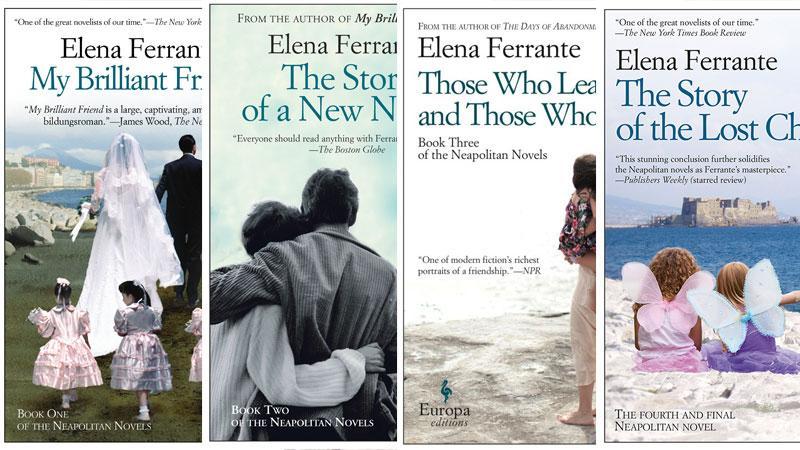What caused a male journalist to investigate Elena Ferrante's identity? Sexism, pure and simple
In the same news cycle, we learned that Kim Kardashian-West was tied up and robbed at gunpoint while alone in a residence in Paris, and that the first reaction on social media was to point and laugh. Now, why on earth would a woman want to keep her head below the parapet?

Your support helps us to tell the story
From reproductive rights to climate change to Big Tech, The Independent is on the ground when the story is developing. Whether it's investigating the financials of Elon Musk's pro-Trump PAC or producing our latest documentary, 'The A Word', which shines a light on the American women fighting for reproductive rights, we know how important it is to parse out the facts from the messaging.
At such a critical moment in US history, we need reporters on the ground. Your donation allows us to keep sending journalists to speak to both sides of the story.
The Independent is trusted by Americans across the entire political spectrum. And unlike many other quality news outlets, we choose not to lock Americans out of our reporting and analysis with paywalls. We believe quality journalism should be available to everyone, paid for by those who can afford it.
Your support makes all the difference.What do you think about when you hear the words “investigative journalism”? The team from the Boston Globe, immortalised in last year's film Spotlight, sifting through cabinets full of documents in a heroic effort to bring down the bad guys? Louis Theroux, peering quizzically into the wardrobe of Jimmy Savile's late mother? Fake sheikhs? Honey traps? A long, noble and vital tradition?
Ears pricked up yesterday when an Italian “investigative journalist” announced that he had a top story, and he was about to reveal it in the New York Review of Books. Had he got the boss of the Camorra? No: he had apparently discovered the identity of a quite popular author of fiction. One who has repeatedly explained why her anonymity was essential to her work as a writer. Hardly Pulitzer-winning stuff.
The author’s nom de plume is Elena Ferrante, and she is probably best known for her Neapolitan quartet of novels, about the gradual unfolding of a friendship and the lives of two women. She has achieved the unusual distinction, for a translated author, of becoming a bestseller in the English-speaking world; been shortlisted for the Man Booker International Prize; and been named by Time magazine as one of the most influential people in the world. And this is in spite of (or perhaps because of) her commitment to her personal anonymity.
Even before her first novel, Troubling Love, was published in 1992, Ferrante wrote to her publisher that she would not be taking part in anything “that might involve the public engagement of me personally”. No discussions or conferences, she wrote. No literary festivals or TV documentaries. “If the book is worth anything,” she told them, “that should be sufficient.”
For her adoring readers, her publisher, and prize committees, her work has been more than sufficient. For those not familiar with the principle of Occam’s razor, meanwhile, more outlandish hypotheses have been expounded about her preference for anonymity over the public life. Why would a thinking woman of the Twitter generation not want the world to know who she is and where she lives?, they demanded. How could an author prefer writing at home to the endless book festival circuit of soggy sandwiches and cheap hotels?
According to some critics, there could be only one answer: Ferrante is secretly a man. We have seen this before, of course, when a shy author called Harper Lee wrote one of the most brilliant and best-loved novels of all time, and then decided that she had done enough. Of course, armchair critics argued, to write this thrillingly about the interior lives of women and girls, she must have been Truman Capote. And so, according to the brave journalist behind Ferrante’s unmasking, he has done her a favour by showing that she is female, after all.
Reactions to this literary non-event have spanned a predictable range. Fans of Ferrante’s work are unsurprised about her gender, and furious about the imposition on her writing life. The vast majority of the newspaper-reading public has shrugged its collective shoulders and said, “Elena who?” In the same news cycle, we learned that Kim Kardashian-West was tied up and robbed at gunpoint while alone in a residence in Paris, and that the first reaction on social media was to point and laugh. Now, why on earth would a woman want to keep her head below the parapet?
There are many injustices in the world worth the attention of good investigative journalists. In America, for instance, a male politician has been subjecting his female rival to vicious personal attacks while refusing to reveal his own tax returns. All over the world, companies are paying women less than men for doing the same work. I expect there are even some political scandals to be uncovered in Italy. But this reporter's scoop of the century essentially boils down to the shocking headline: "Woman writes books". Don't hold the front page.
Join our commenting forum
Join thought-provoking conversations, follow other Independent readers and see their replies
Comments